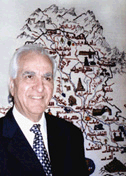Baghdad: The cradle of tourism imagination
My first visits to Europe started in 1955, ten years after the end of WW2. Germany was my first stopover. I had been on training courses there, starting relations with industrial companies and taking part in specialized international exhibitions. I presented myself as an Iraqi, at a time when foreign visitors to these exhibitions hardly exceeded some hundreds and the Germans among them were very few. The signs of war were still perceptible in most places. The war legacy also left its mark on the German people who had the will and the serious intent to rebuild the country.
While presenting myself as an Iraqi, my interlocutors did not manage to recognize what Iraq is or to locate it! And they raised many questions. To affirm my identity more, I added that I am from Baghdad. And this name had a magic effect on them in particular the pre-war generations, the majority of whom entertain tales of the Arabian Nights, the Caliph Al-Rashid and Scheherazade, Sinbad, Ali Baba and the 40 thieves, carpet stealing etc.
This proved to me that such tales were taught in German schools, long before the creation of modern children’s stories based on computer technology. These stories have subsequently been translated into Arabic to feed the spirit of our children. The tales of Baghdad dominated the imagination of my businesses companion, who was from the old generation, and who sometimes introduced me to other companies’ representatives as Ali Baba, without the 40 thieves, or as Shahrayar, the lover of Scheherazade, or other mythical characters from Baghdad, which saturated his imagination and that of his fellow-citizens.
Before WW2, the concept of tourism, with its diverse prospects, was not known as we know it today. Most people stayed in their cities and villages. The only leisure and entertainment consisted of fictional tales about civilizations and cities, written by men of letters and read in living rooms. These tales left their mark through the years on the imagination of the people of the world.
The translation of the Arabian Nights into European languages since the 18th century played a major role in the imaginary configuration of Baghdad in the Western mind. It became one of the myths told to the Western public which was reflected in the tales narrated in the style of the Thousand and One Nights since the Middle Ages. We assume that Westerners heard of the Thousand and One Nights before the 18th century. When cinema was created at the end of the 19th century, the world of Baghdad had a share in it, particularly since the 1930s. Westerners became familiar with Sinbad and Aladdin and his magic lamp, and other mythical or realistic characters mentioned in Arab literature.
If Aladdin and his genii imprisoned in his magic lamp belong to the mythological inheritance, nowadays we deal with an equally impressive genii the computer. It is extraordinary: with each click, it says to you: I am your servant, asks what you want and carries it out for you! One can download photographs of Iraqi heritage in three dimensions, as well as realistic photographs of its remote and recent past, accompanied by useful information of the Orient and Occident. It can also play a part in activating tourism in Iraq, stimulating its economy and once again putting it on the map of world civilisation.
Where is the Baghdad of the past today?
Where is Baghdad today, once the symbol of Iraqi unity and the capital of the country?
These ideas and questions came to my mind while listening to the speeches and comments of the participants in the International Covenant for Iraq, held in Kuwait, from October 31st to November 1st 2006 convened by the Kuwaiti Fund for Arab Economic Development and chaired by Mr. Ashraf Qadi, representative of the United Nations in Iraq and Dr. Barham Saleh Iraq’s Deputy Prime Minister. He headed a large delegation including ministers and members of parliament. It was opened by the Deputy Prime Minister and Foreign Minister of Kuwait, Sheikh Mohamed Sabah Al-Salem Al-Sabah. High level delegations from 16 countries took part.
I participated with Iraqi businessmen from inside the country and those living abroad. It was a busy day, where the main paper of the conference was presented for debate. The debate was followed by an agreement on the articles, after taking into account the modifications suggested by the different bodies committed to the Covenant to support Iraq in the present critical phase. The proposed amount, not exorbitant at today’s prices, was $100 billion, for rebuilding, on the human, social and economic scales, necessary to ensure a decent life for Iraq’s citizens.
The speakers tackled the questions of Iraq with enthusiasm and seriousness. Representatives from various countries remained glued to their chairs despite the length of the meetings, in order to listen to the different points of view of the Iraqis in charge and the representatives of the participating countries. They spoke about ways to make the country overcome its problems and find peace. All the participants agreed that the solutions must be accompanied by economic, political and social measures and other means to find the stability and peace necessary for the good life to which everyone in the world aspires.
The debate focused on oil and the investment in wells to the detriment of other economic sectors. Tourism was not given the importance it deserves: its positive effects are not limited to the economic field, but impinge on other sectors. Nevertheless certain participants did not fail to underline the role of tourism in economic development. I must recall that my articles in ITM threw light on the assets of diversified tourism, such as religious, cultural and eco tourism, including rivers, lakes, marshes, etc I summarized the prospects for Iraqi tourism in my first article after the fall of the dictatorial regime, entitled: “Will Iraq be an international tourist destination?”
The richness of Iraq is not limited to the oil and its other natural resources, but also includes its tourist treasures and cultural heritage. Our promotion of Iraq as an international partner must be based on tourism and the prospects for appreciating its territory and profiting from the various historical and religious lessons which are abundant from north to south, and from east to west. This is why we address the people of countries supporting Iraq, as well as their governments, to help Iraq overcome its crisis and to secure it against the external interventions of countries who don’t want the good of Iraq and are by no means concerned about world peace.
It is incumbent on the Arab countries, and the neighbouring countries, to contribute to peace and stability in Iraq, which will have an important effect on their peace and stability. They must also open their borders to Iraqis and treat them with respect, as was the case for Iraqi visitors and tourists during previous decades when the doors of Iraq were wide open to all visitors and hard-working Arabs. This will foster and consolidate feelings of friendship and respect between the people of the area and the Iraqis who have made a rich contribution in terms of human resources and knowledge throughout the centuries.
Tourism is nowadays the most important sector of economic development. Iraq, which is rich in tourist landmarks will benefit from its historic, archaeological and natural attractions. It has a heritage for the whole of humanity, not only that of a nation, a religion or a civilization. Hence, this call is extended to the people of the whole world to help the new Iraq get over its crisis and play its enlightened role in the development of the region.
The images of Babylon, Nineveh, Sumer and Akkad, their statues and their relics are found in the most prestigious museums of the world from the Gate of Ishtar in Babylon which was transferred, a century ago to the museum of Berlin, down to the smallest archaeological piece kept in the French Louvre and the British museum. This heritage still attracts the interest of the public and encourages them to visit the country of origin, Iraq, with its civilization and culture.
The first thing that came to the mind of the Europeans in the wars devastating Iraq, was its cultural heritage and fate. International calls to avoid its destruction and plundering multiplied. If this civilizational heritage did not have a great importance, there would not have been such an outcry about it.
There are also the sanctuaries of the Imams, the Companions of the Prophet and the saints of all sects, as well as the sanctuaries of the prophets in northern Iraq, and other sacred sites of various religions. That is in addition to the diversified nature of Iraq, in particular its rivers, lakes of the north and marshes of the south.
We must advertise Iraq and promote it with the people of the whole world, and their governments. We must emphasize its importance to the region and the world under the rubric of tourism with its civilisational, historical, economic and cultural potential. If politics destroyed bonds between the people of the area, let us hope that tourism is the bridge between peoples and nations.
May God guide us to success. A.S. Shakiry
|

